This post first appeared on Edudemic.
“You are a liar and I will never, ever, trust you again!” The student rose to his feet at the conclusion of a role-playing simulation in our negotiation class, pointing across the room at another student who had misled the other team and then changed his own vote.
The other student, a little shaken, raised his hands in protest. “Dude, relax, it’s just a game.”
“That’s exactly what I mean!” the first student continued. “If you’re willing to do this in a game, what would you be willing to do if the stakes were real?”
The way we play games mirrors how we act in real life. A 2008 study by the Pew Internet and American Life project found that 97% of teens play computer games. On top of that, half of all teens reported playing a video game “yesterday.” Some of these are simple puzzle games on their phone or tablet, but many are surprisingly sophisticated role playing games such as League of Legends or The Elder Scrolls Online. In my own classroom, I have often found that students who don’t seem to have a terribly profound insight into their actions in the classroom are often very self-aware of the choices they make in online gaming situations.
A new area opens up in the online game world. What do you do? A. Explore all the new places? or B. Get all the new loot?
The Bartle Test of Gamer Psychology is an online multiple choice test that asks questions such as the one above. On one of the first days of class, I ask my students to take the Bartle Test online, and report their results to me on a Google Form. It takes about twenty minutes. Based on the students' answers, it assigns a weight in four separate categories: Socializer, Achiever, Explorer, or Killer. Students will often be a mixture of more than one category, although most of the weight will usually be in one category. I use these results to inform how I make groups and how I ask kids to collaborate. The test is based on how students play games. It offers useful insight into how students will react in different situations, and also provides a starting point for me at the beginning of the semester.
Explorers
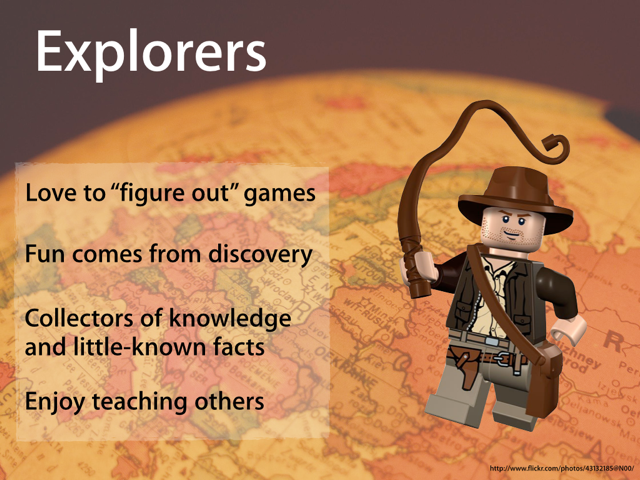
Students who are Explorers love to explore and wander. In the game world, Explorers want to map the entire area and discover all of its hidden areas. In the classrooms, Explorers love to amass large quantities of knowledge. Their sense of achievement comes from knowing more facts (often obscure ones) and finding secret shortcuts or mnemonics. They love to demonstrate their knowledge to others. I often ask my Explorers to “map out” a new unit of curriculum a couple of weeks before the rest of the class. Can they scout out where the pitfalls might be, and where others might be confused? Can they blaze a trail for the rest of us? Explorers are the closest to what we consider to be the ideal “academics”: those who value knowledge for knowledge’s sake. Yet, Explorers are often those kids who will do all of the work for a project — then forget to turn it in. They’ve already gotten the value from the project. Turning it in for the grade is just not at the forefront of their minds.
Achievers
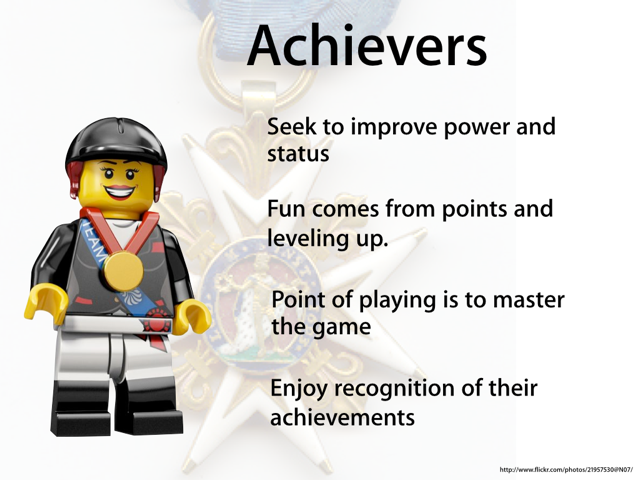
By contrast with Explorers, students who are Achievers love to gain levels, badges, and awards. In the game world, Achievers gain a sense of accomplishment by being the first to complete something, or by being one of the only ones to win a trophy or reward. They are often very motivated to "beat the game" and move on. In the classroom, Achievers are often most concerned with grades as a measure of their achievement. They want to know the quickest, fastest, or shortest way to the prize. They are often detail-oriented, and I can count on the Achievers in my classroom to help move the others along, simply for the thrill of succeeding.
Socializers
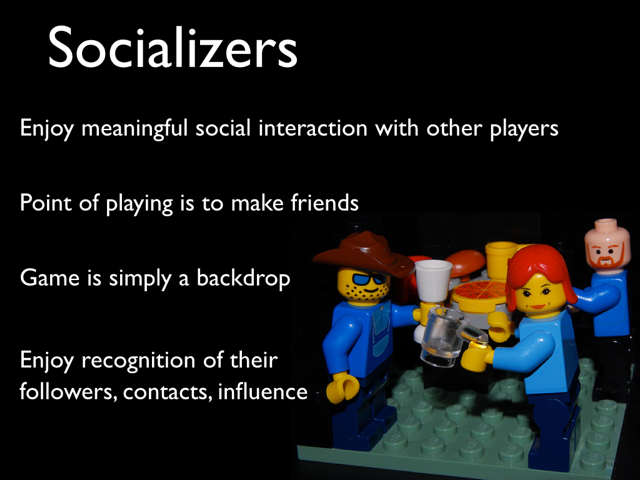
The greatest percentage of my students are Socializers who are motivated by the desire to form meaningful connections and relationships with others in class. In the game world, the Socializers are often the connectors, who help to form questing parties and seem to know everyone online at any given moment. Socializers often form clans, which are groups of like-minded gamers, and when a particular game gets old, Socializers will simply switch games, keeping the clan intact. The game is simply a backdrop for the chatting and interactions that are the true draw. Socializers judge their accomplishments by how many friends, or how many followers, they have. How many of us know students for whom the classroom is simply a backdrop for their friendships and social life
Griefers or Killers
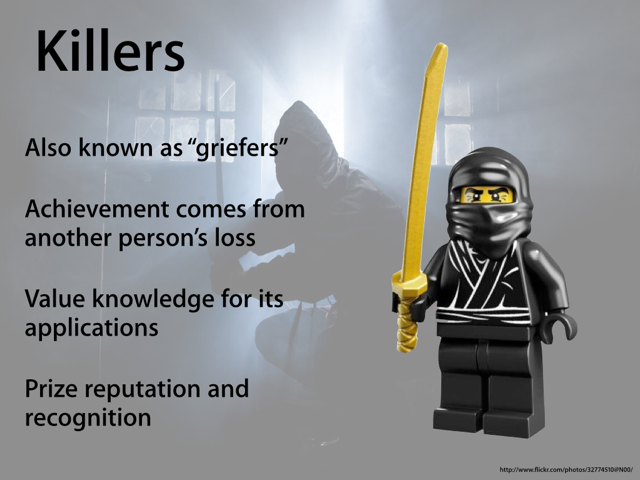
The smallest percentage of students are known as Griefers, or Killers. In the online gaming world, griefers willfully damage and vandalize other people’s creations. They take pleasure in the turmoil they cause in the game world, and in the damage they wreak on others. In the classroom, those students often are the first ones to see if they can “hack” the system, and are often willfully oblivious to the consequences to the community. However, Griefers are often your risk-takers, the ones who are used to starting over with nothing, over and over again — because they’re always being killed — and who don’t mind being wrong. They are likely to have a growth mindset, rather than a fixed one, and if you can draw them into the classroom community, they can have a positive influence on others.
Forming Collaborative Groups
What can you do once you have a list of your students and their percentages in each of these categories? You can sort the list by any of the categories and assign groups accordingly. If I want collaborative working groups, I will sometimes ask students to form their own groups with one of each type of gamer in each group. Or, sometimes, I will ask for my Explorers to form a group to do some preliminary research, my Achievers to formulate a plan, my Socializers to publish and share our process, and my Griefers to look for flaws in the game plan.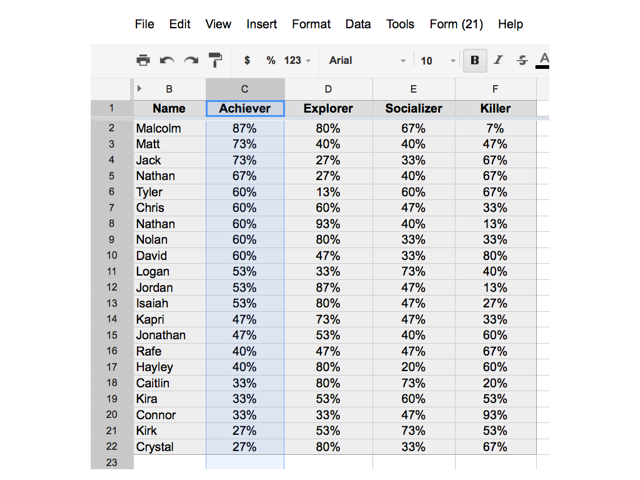
Sorting my students in this way allows me to focus on those areas where I most need to provide support. I know at the beginning of the year, I need to actively bring Griefers into the fold, before they get themselves in trouble. I need to keep the Explorers from wandering off into the woods. I need to broaden the perspective of my Achievers and not let their razor-sharp focus keep them from seeing the big picture. All of my students need to appreciate each other’s strengths, and learn from each other. The Socializers can keep everything moving, and let me know when they sense trouble in the working groups, since they are usually closely attuned to who’s working with whom.
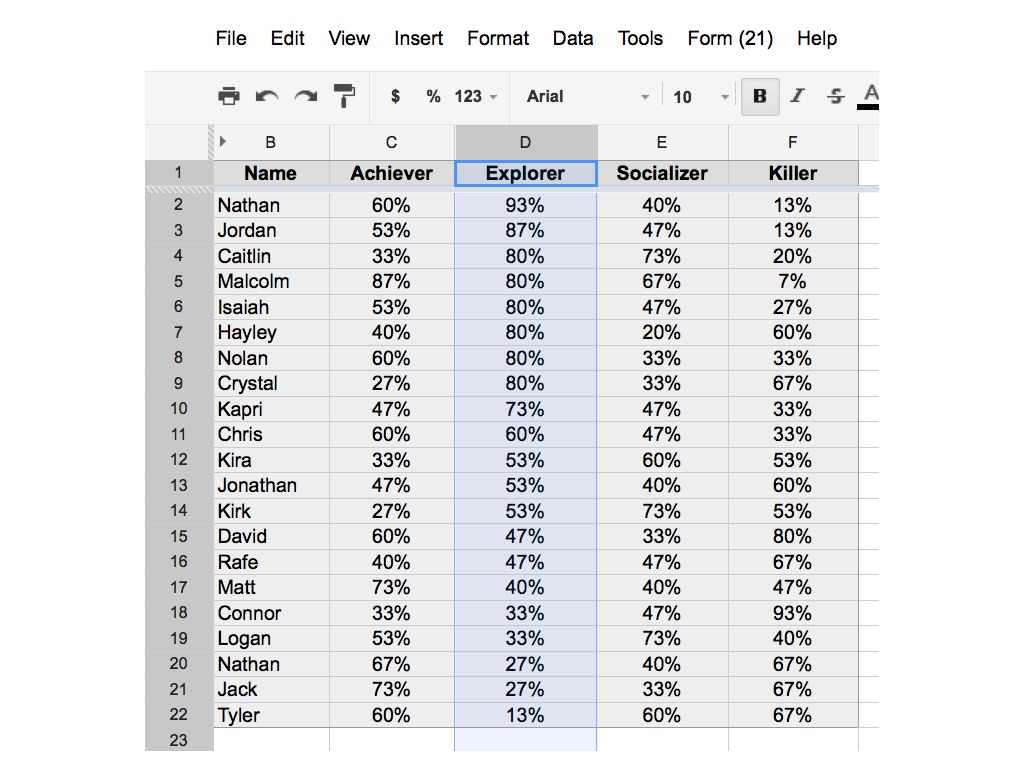 This activity works best with middle and high school students. The Bartle Test is not scientific, and it’s just a small test with subjective results. But it’s written in a language my gamer students understand, and the results are fun and spark discussion. In my experience, there is no such thing as behavior that is “just a game.” How we play mirrors how we live, and the choices we make. My students generally feel the Bartle Test results are pretty accurate, and it’s a simple starting point for the complex task of adapting my learning environment to meet the needs of every learner in the room.
This activity works best with middle and high school students. The Bartle Test is not scientific, and it’s just a small test with subjective results. But it’s written in a language my gamer students understand, and the results are fun and spark discussion. In my experience, there is no such thing as behavior that is “just a game.” How we play mirrors how we live, and the choices we make. My students generally feel the Bartle Test results are pretty accurate, and it’s a simple starting point for the complex task of adapting my learning environment to meet the needs of every learner in the room.
How would you score? Take the free Bartle Test yourself: http://www.4you2learn.com/bartle/bartletest.php?test=ind or Try the free Bartle Test iOS app: https://itunes.apple.com/
NOTE: MMORPG is short for Massively Multiplayer Online Role Playing Game, an online game world that is running consistently, like World of Warcraft or Everquest.

